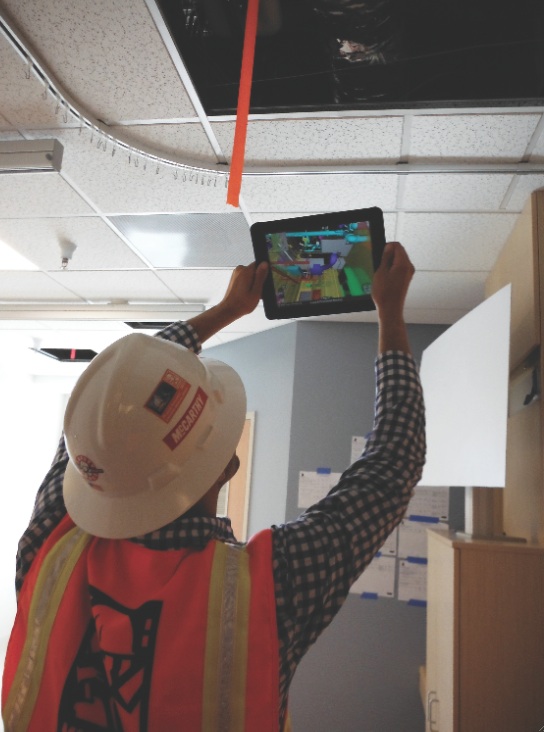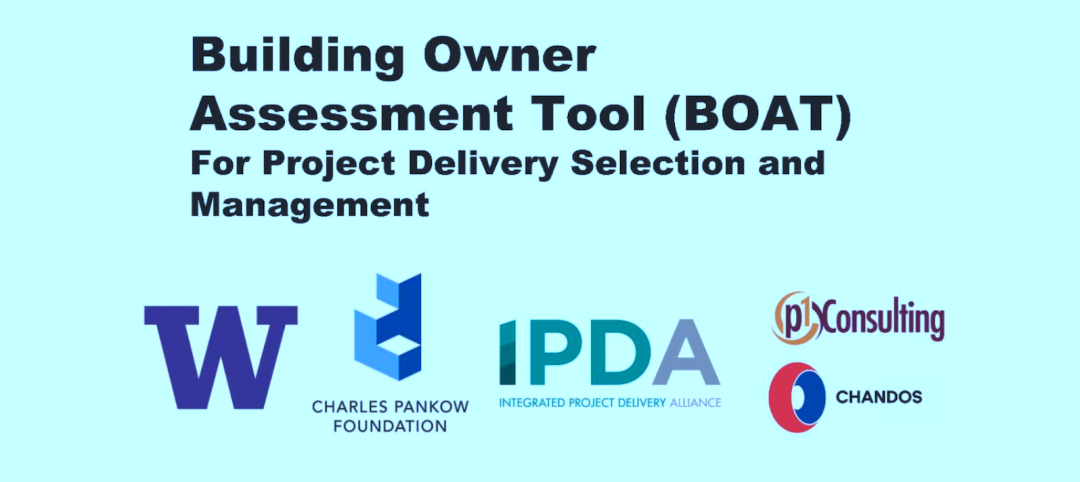Building Design+Construction reached out to AEC professionals who have studied and applied augmented reality and asked them to pinpoint applications that are ripe for the technology. Here’s what they had to offer:
1. Business development. Three-dimensional models are great for communicating your vision for a building project, but imagine the impact of being able to take potential clients on a walking virtual tour of a design scheme while on the site. For instance, some luxury condo developers are testing AR for use by their sales teams for virtual tours during the preconstruction and construction phases. And some high-end homebuilders are using the technology in their physical model homes to better demonstrate upgrade options.
2. Design visualization at all phases. Any time there’s data to be visualized, there’s a good case for AR, says Autodesk’s Dace Campbell, AIA, LEED AP. “Photo-matching is a common practice for many designers, using tools like Photoshop to show ‘what if’ scenarios overlaid in a real context,” he says. “AR supports the rapid study of design alternatives, with real-time photo-matching from any viewpoint, and at full scale.”
3. Survey and layout. “Whether you’re surveying the real world to gather data to put into a virtual model or are doing layout with survey tools, to me that’s a strong case for augmented reality,” says Campbell. “If we had accurate, dependable position tracking, arguably you wouldn’t need a tape measure. It would be the next generation of the total station, where the virtual projection shows you precisely where each component of the building gets installed. Except, unlike with a total station, layout is done intuitively and in real time.”
4. Design analysis. With AR, virtually any analysis a Building Team already does on screen—seismic analysis, acoustic performance, structural modeling, etc.—hypothetically can be performed in the physical space. “We can already do that with today’s CAD and BIM tools, but AR will enable us to perform analysis at full scale while walking around a project site,” says Campbell.
5. Design assistance and constructability review. Being able to perform constructability review in situ during construction with both the architect and contractor standing in the same space has tremendous potential for enhancing communication and confidence, as well as cost and time savings.
6. Scheduling and site logistics planning. AR can extend today’s 4D scheduling tools to the project site, enabling a real-time look at the actual progress of a construction project compared to the planned progress while team members are touring the construction site. It can also be used to help visualize phased site logistics on complex projects.
7. Prefabrication. “Some forward-thinking contractors are looking at AR to support prefabrication inside a shop,” says Campbell. An advantage to prefabrication is higher quality, since laborers are assembling components in a factory, away from inclement weather.
8. General fabrication installation. Firms can use AR to help guide a building component into place. Furthermore, AR can support the installation effort by augmenting the laborer’s view with specific assembly instructions, specifications, and relevant standards.
9. Quality control, punch lists, and inspections. Whether it’s a municipality official doing an inspection or a contractor checking construction, quality control is an easy entry point into AR for many firms. For example, an inspector can make sure all the sleeves are in the right location before they complete formwork for a shear wall. Being able to overlay the BIM model of what was intended versus what is actually in place could offer huge benefits for construction teams.
10. Safety. AR can enable teams to do spatial safety audits, making sure, for example, work isn’t taking place above or below other critical work. Also, hazardous work and critical emergency information could be highlighted in an AR view so that all workers are aware of on-site hazards and remedies. For instance, laborers doing hot work on a roof could be alerted to the location of the nearest fire extinguishers.
11. Commissioning. With AR, you can overlay metadata onto the assets in the facility and extend what has taken place during punch listing and inspections. Agents responsible for commissioning and testing can have relevant information about a building asset available to them in context, without having to search through reports and logs to find or enter a specific point of information.
12. Facility operations and maintenance. Campbell calls AR the “ultimate stud finder.” Provided that the BIM model is updated to offer an accurate representation of what was built, facilities professionals can use AR to look behind walls, above ceilings, and below floors without ever touching the space. A facility engineer could get a pretty good idea of where building systems reside without performing destructive demolition and surveying.
Read our full report on augmented reality for the AEC field.
Related Stories
Giants 400 | Aug 30, 2023
Top 75 Engineering Firms for 2023
Kimley-Horn, WSP, Tetra Tech, Langan, and IMEG head the rankings of the nation's largest engineering firms for nonresidential buildings and multifamily buildings work, as reported in Building Design+Construction's 2023 Giants 400 Report.
Building Team | Aug 28, 2023
Navigating challenges in construction administration
Vessel Architecture's Rebekah Schranck, AIA, shares how the demanding task of construction administration can be challenging, but crucial.
Laboratories | Aug 24, 2023
Net-zero carbon science center breaks ground in Canada
Designed by Diamond Schmitt, the new Atlantic Science Enterprise Centre (ASEC) will provide federal scientists and partners with state-of-the-art space and equipment to collaborate on research opportunities.
Multifamily Housing | Aug 24, 2023
A multifamily design for multigenerational living
KTGY’s Family Flat concept showcases the benefits of multigenerational living through a multifamily design lens.
Multifamily Housing | Aug 23, 2023
Constructing multifamily housing buildings to Passive House standards can be done at cost parity
All-electric multi-family Passive House projects can be built at the same cost or close to the same cost as conventionally designed buildings, according to a report by the Passive House Network. The report included a survey of 45 multi-family Passive House buildings in New York and Massachusetts in recent years.
Regulations | Aug 23, 2023
Gas industry drops legal challenge to heat pump requirement in Washington building code
Gas and construction industry groups recently moved to dismiss a lawsuit they had filed to block new Washington state building codes that require heat pumps in new residential and commercial construction. The lawsuit contended that the codes harm the industry groups’ business, interfere with consumer energy choice, and don’t comply with federal law.
Government Buildings | Aug 23, 2023
White House wants to ‘aggressively’ get federal workers back to the office
The Biden administration wants to “aggressively” get federal workers back in the office by September or October. “We are returning to in-person work because it is critical to the well-being of our teams and will enable us to deliver better results for the American people,” according to an email by White House Chief of Staff Jeff Zients. The administration will not eliminate remote work entirely, though.
Building Owners | Aug 23, 2023
Charles Pankow Foundation releases free project delivery selection tool for building owners, developers, and project teams
Building owners and project teams can use the new Building Owner Assessment Tool (BOAT) to better understand how an owner's decision-making profile impacts outcomes for different project delivery methods.
Transportation & Parking Facilities | Aug 23, 2023
California parking garage features wind-activated moving mural
A massive, colorful, moving mural creatively conceals a newly opened parking garage for a global technology company in Mountain View, Calif.
Giants 400 | Aug 22, 2023
Top 115 Architecture Engineering Firms for 2023
Stantec, HDR, Page, HOK, and Arcadis North America top the rankings of the nation's largest architecture engineering (AE) firms for nonresidential building and multifamily housing work, as reported in Building Design+Construction's 2023 Giants 400 Report.

















